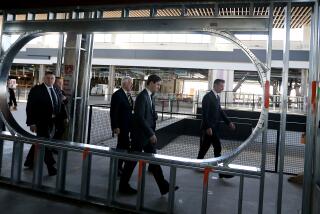Hitachi Chemical Co. to Build $12-Million UCI Research Facility
- Share via
Hitachi Chemical Co. has reached an agreement with UC Irvine to build a $12-million research facility on campus to be used jointly by the Tokyo-based manufacturer and the university, school officials said Monday.
L. Wade Rose, assistant dean of community affairs and development for the UCI College of Medicine, said the project “would be the first time a Japanese corporation built a research facility on a UC campus.” He said he also does not know of a Japanese company operating on any other campus in the country.
The agreement, which will be presented for approval to the UC Regents at their March 17 meeting, calls for Hitachi to construct a 40,000-square-foot building on about 1.5 acres leased from the university within the medical school complex.
The main objective of the campus in the proposed arrangement with Hitachi, Rose said, is to provide much needed laboratory space for faculty and students of the medical school. Instead of paying cash to the university to lease the site, Hitachi will give the university 13,000 square feet of laboratory space in the building, he said. Hitachi will use the rest of the facility for its own research.
The 40-year lease would be worth an estimated $2.5 million--the equivalent of the appraised value of the land--according to UCI Associate Vice Chancellor William Parker. At the end of the 40 years, the building would be turned over to the university.
A similar arrangement was worked out between the university and Nelson Research & Development Co., which in 1984 moved its headquarters into a 50,000-square-foot building it constructed next to the medical school.
While other universities such as Duke, Stanford, and the University of Utah have leased university-owned land in industrial parks to private industry, Parker said he believes that UCI is unique in allowing private enterprises to operate on campus.
“We are deeply motivated by our need for space,” Parker said. “The lack of adequate research space is probably the most severe problem we face right now limiting the growth of the research activities of the medical school.”
Parker acknowledged that shared quarters by university faculty and private researchers “puts a special burden on the negotiations to ensure that academic freedom and intellectual property rights are carefully defined.”
As part of the agreement, he said, Hitachi will abide by university policies regarding animal and human testing and disposal of toxic materials. Also, he said, the company has agreed that any patents stemming from joint research endeavors between university and Hitachi researchers will belong to the university.
Rose said Hitachi Chemical--which manufactures electronic materials, synthetic resins, ceramics, pharmaceuticals and other chemical products--plans to form an American subsidiary to construct and operate the proposed UCI facility.
Hitachi Chemical, a company with $1.4 billion in annual sales, chose to locate at UCI because the university’s strengths in medical research coincide with the company’s own research interests, said Rose.
He said the Hitachi facility at UCI would concentrate on four general areas of research: the development of drugs to treat brain diseases; the development of biological probes to diagnose diseases; the development of biologically engineered bacteria to treat toxic waste, and the development of electronic equipment for medical diagnostic purposes.
Hitachi Chemical officials could not be reached for comment.
Parker said greater cooperation between industrial and faculty scientists might help expedite the transfer of university laboratory research into commercial products and services.
Aimed at Basic Research
“As a university there is a lot to be gained from intellectual exchange between industrial and academic scientists,” Parker said.
Rose conceded, however, that so far the relationship between the UCI faculty and Nelson has not produced as many joint research projects as university officials had hoped. He said Nelson’s research has been aimed at developing specific drugs while the university faculty has been more interested in basic research. He said the university has been trying to work out a more compatible plan with Ethyl Corp., a Richmond, Va., chemical and petroleum products maker that acquired Nelson a year ago.
The proposed research facility is not the first time that Hitachi has shown an interest in UCI. In 1984, the company helped UCI recruit Masayasu Nomura, a world famous biochemist, for its medical school faculty by providing a $600,000 gift toward endowing an academic chair. Since then, Rose said, Hitachi and university officials have been discussing having Hitachi build on campus. Hitachi decided to go forward with the project last spring, he said.
More to Read
Inside the business of entertainment
The Wide Shot brings you news, analysis and insights on everything from streaming wars to production — and what it all means for the future.
You may occasionally receive promotional content from the Los Angeles Times.










